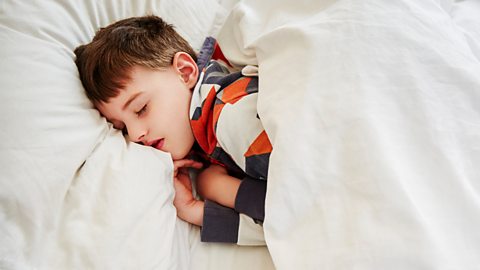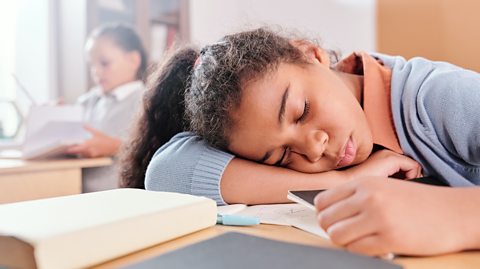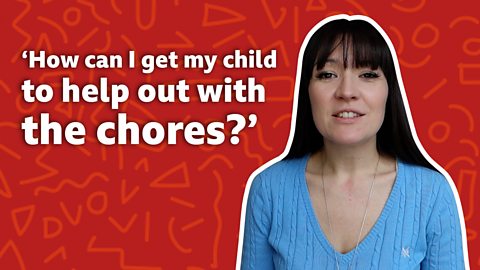
Dr Oscar Duke, otherwise known as тThe Doctor Dadт, knows how hard it can be to help children get a good nightтs sleep. Here, he provides some practical tips for good sleep hygiene, including how to get into a routine and how to wind down anxious minds.

Dr Oscar's tips
Plan a routine
Having a routine is one of the best ways to help develop whatтs known as good тsleep hygieneт.тЏThere are no set rules when it comes to sleep routines, but itтs generally thought that most 5-11 year-oldsтЏneed between 10 and 12 hours sleep every night.тЏWork out the best bedtime by counting 10 to 12 hours backwards from when they normally wake up. Try to stick to this time but donтt panic if it doesnтt work out every night.
Keep children away from over-stimulation wherever possible in the evenings.тЏтЏ As tempting as it is to get phones and tablets out to wind down, science shows that blue light emitted by TVs, tablets and phones directly interfere with melatonin - the hormone which controls sleep. Avoid screen time for at least an hour before bed and have a relaxing bath and cuddle up with a book instead.тЏтЏтЏSleep is important for brain development so getting enough allows children to feel fresh and alert the next morning. Not only does sleep give our brains and bodies time to recover, but it also helps to maintain good mental health.
Get moving
Exercise is crucial for your childтs physical health, mental wellbeing and a good nightтs sleep.
тЏEncourage children to get their heart rate up during the day by playing ball games outside, playing tag, or doing at home workouts with the rest of the family.тЏA great exercise to do in the evening is yoga. Yoga incorporates stretching and deep breathing which can help relax the body and relieve any tension from the day.
Exercise increases fitness, reduces stress and also helps to develop motor and coordination skills too. Itтs also an excellent way to avoid sibling squabbles, build relationships and keep healthy at the same time.
Talk about feelings
Try to have a quiet, reflective period of time before bedtime. Let go of anxieties and concerns by encouraging conversations around your childтs feelings. Ask simple questions like тdid anything make you feel sad today?т - you wonтt always know the answers but be sure to listen and engage with what they are saying. Working through a problem with them is often the best strategy and it shows that sharing a problem, however small it may seem, can be a big mental relief.тЏтЏтЏPerhaps ask your child to list five positive things theyтve been grateful for that day, whether itтs a sibling, a helpful teacher, a friend or aтЏfavouriteтЏtoy - focusing on positivity is a wonderful way to end the day.

Activities to try at home

'Thought balloons'
Letting go of any anxieties or concerns before sleep is really important to ensure a restful night. When putting your kids to bed, sit with them toтЏvisualiseтЏputting each distracting thought into an imaginary balloon, whilst closing their eyes and watching it drift off into the sky above.
Do some mindful meditation
Before bed, get into the comfiest pyjamas and sit with your child/children in a circle. Play some meditation music, or ocean or rainforest sounds. Hold hands, close your eyes and take some deep breaths for 5- 10 minutes. This quiet time will definitely get you relaxed and sleepy!

Dr Oscar's video

More from ТщЖЙдМХФ Bitesize Parents' ToolkitтІ
Parents' Toolkit
Fun activities, real-life stories, wellbeing support and loads of helpful advice - we're here for you and your child.

Michael Mosley: Five tips for helping your kids sleep well
Dr Michael Mosley offers advice on improving health and concentration through better sleep habits. Here are his tips for parents to help their kids.

Teenagers - a good night's sleep
Anjula Mutanda talks about the struggle of helping teenagers get a good night sleep with conversation with Bez and son Arlo

What's the best food for my child's brain, mind and mood? - The Super Tutors
Catherine Jeans, a.k.a. 'The Food Know-It-All', explains how food affects a child's sleep, learning and mood.

How can I get my child to help out with the household chores? - The Super Tutors
'ТщЖЙдМХФ Hack Master' Rhi explains how you can persuade your child to help keep the house clean and tidy.

What's the best alternative to screen time? - The Super Tutors
Shona Goodall, 'The Fun One', explains how you can tempt your child away from the tech.
